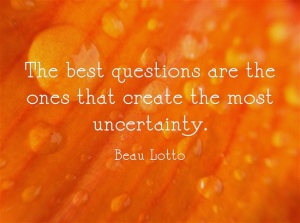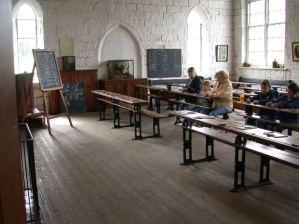
Any material being read, or listened to, will connect with individuals differently, depending on their prior knowledge and interests. An idea might spark curiosity in one, that another would dismiss as inconsequential. Sometimes a reader will pick at a thread that hadn’t been intentionally placed for further investigation. Oftentimes, authors don’t get to benefit from readers’ feedback, and may not be inspired to conduct further research for themselves.
But bloggers do!
Or bloggers with wonderful readers who participate in discussions and share their ideas! I am always grateful to you my readers for your encouragement to keep on learning. You are constantly challenging my assumptions, offering alternate views, and inspiring me to seek more information. I love it.

While I emphasize the importance of maintaining a sense of wonder, and of encouraging children to ask questions, I’m not always good at asking those questions myself. I learned that lesson well; so am appreciative when others stimulate questions.
During this past week there have been a couple of robust conversations here: one about audiobooks and cheating; and another about common curricula. The conversations branched into fields as different as science fiction and history. Thank you to those who joined in.
In This too will pass I mentioned that each state in Australia had its own set of curricula. This places an extra burden on children changing schools, particularly interstate. The mention of our new National Curriculum made Charli Mills curious about how US education evolved. She assumed it was fairly uniform across the states, with the school year developed around farming so that children could help out in the fields.

I thought that our Western systems of schooling had originated with industrialisation. However, Charli responded saying that industrialisation had had little influence on education in the West (of the States). So of course I was compelled to check my assumptions!
A Google search brought me to this document Industrialization and Public Education: Social Cohesion and Social Stratification which does seem to verify a relationship between industrialisation and schooling. (But one of the most interesting things to me is the cost of a chapter, and of the entire book this first page comes from. Have a look!)

I also found an abstract of Chapter 2 Long-Term Trends in Schooling: The Rise and Decline (?) of Public Education in the United States, from another book, that seems to support Charli’s understanding of the homogeneity of education in the United States. I haven’t read it yet, but it could be informative.
I couldn’t let the topic of schooling and industrialisation go without sharing a talk by one of my favourite educators Sir Ken Robinson. This is a shorter animated version of a longer talk, which I’ve also included if you are interested in listening to the original.
This is the animated abridged version:
This is the original:
Now, I have to wonder, in light of the discussion about cheating mentioned earlier, would watching the shortened version qualify as having watched the talk, or would it be considered cheating?

Thank you for reading. I appreciate your feedback. Please share your thoughts.


Great questions! And thanks for sharing your investigations. I look forward to watching Ken Robinson’s clip. Funny how the things we can often take for granted stem from ye olde traditions, like leaving a break in schooling to help on the farm.
LikeLiked by 1 person
Thanks Bec. We tend to accept traditions and rituals without question, until we stop and think: why is it so? It’s important to assess established processes every now and again to make sure they are best practice. 🙂
LikeLike
You certainly sparked my curiosity, challenged my assumptions and got me even more curious about Australia’s migrant culture in comparison the the one in the US. Ah! I love your posts and how they spark such dialog and exploration. Now that I’ve been thinking, education was a pillar of America’s design. What I’ve seen historically with the westward expansion is that every place had a schoolhouse. Even the Elmira Schoolhouse once attracted educators from “back east” and that was a point of pride for such a new and small community. But as the link you shared expresses, America has struggled more and I think as some of my teacher friends responded, the Common Core is part to blame. I did cheat, though and watched the shorter version! I’ll redeem myself later and come back for the second.
LikeLiked by 1 person
I don’t think you cheated at all. I think the shortened animated video was a wonderfully succinct way to understand the gist of Robinson’s message.
I’m pleased you enjoyed the post and am always grateful for the discussion and therefore, learning I do as a result. While our Western education systems are often spoken of as being similar, and they certainly are, the differences are not always highlighted. When I was at College I did a semester on Comparative Education, which looked at different systems around the world. Sadly I remember little of it. I’m thinking it’s time to do some more comparisons.
LikeLiked by 1 person
While I like finding commonality, it’s important to see and understand the context of differences, too. Ultimately we are all the same, but oh-so-different! 🙂 I think we learn more about each other or our cultures and nations when we can meet on common ground and share those differences. I’d enjoy reading more of those comparisons!
LikeLiked by 1 person
Thanks Charli. That’s so true. Unless we can find something in common, there’s no meeting place at all. It’s only from that meeting place that we begin to understand and accept the differences.
I’ll see what I can do about some comparisons.
LikeLiked by 1 person
Interesting! I was taught that compulsory education developed alongside industrialisation, not for the benefit of the pupils but for the industrialists, so that ‘factory fodder’ would develop a sense of clock-based ordered behaviour.
I agree with his concerns about ADHD diagnosis as doing a similar thing, supressing their exuberant behaviour.
LikeLiked by 1 person
Thanks, Anne. Your view on compulsory education seems to match Sir Ken’s. My statement relating to the need to have something for the children to do may have been more in relation to the first Waldorf school which was opened to cater for the children of the factory workers.
I think that sitting quietly in desks for long periods listening to someone talk about something of little interest suits few. I think I’d be squirming in my seat and probably suffer from more than ADHD!
Thank you for adding your wisdom to the conversation.
LikeLiked by 2 people
A lot to think on here (and must catch up with the post you’ve mentioned)! I absolutely love your first line here: “Any material being read, or listened to, will connect with individuals differently, depending on their prior knowledge and interests.” And I’m really interested in that link about Long-Term Trends in Schooling. Will check that out. Thanks for sharing all this and will go read some other posts…cheating? Hmm. 😉
LikeLiked by 2 people
Thank you for reading and commenting, Sarah. I’m so pleased you found ideas of interest in this post. 🙂
LikeLiked by 2 people
Any post that directs me towards Ken Robinson is a winner, Norah! I discovered him a while ago when I was challenging technique over creativity. We teach our kids any number of techniques these days but fail to see that if left alone to think for themselves, they’d probably master a technique on their own. K R’s Ted talk on creativity echoes all of this, the man is a genius and Britain is poorer for him relocating to the States. Who, incidentally, aren’t the only nation who are homogenising the minds of the young.
LikeLiked by 1 person
That’s great to hear Jenny. Sir Ken needs as many fans as we can muster. His talk about how schools kill creativity was the first I listened to, and I was hooked. I think what he describes is a worldwide malaise. Fortunately his words can be heard across the globe. Unfortunately, those with the power to make a difference seem to be deaf to them. Fortunately for students, teachers do what they can to tweak the expectations in ways that support and empower them.
I can also think of other nations’ homogenisation processes. Their similarity makes them distressingly familiar.
LikeLiked by 1 person
I intend to watch the talk you’ve posted here in its entirety- once the Olympics have finished!
LikeLiked by 1 person
I’d be happy to hear your thoughts. Enjoy! 🙂
LikeLiked by 1 person
I’ll let you know!
LikeLiked by 1 person
Thanks. 🙂
LikeLike
For many years I railed against the notion of age-based teaching; at 11 I took my 11+; ditto my brother two years earlier. He, precocious lad scored top marks and won a place at a top school; me, not so fast out of the blocks scrapped through to a lower school but still academic. Two years later we changed schools. Because of his record and a sibling policy the new county placed us in the same school; I can’t be sure but perhaps I wouldn’t have ended up there if on my own. It was great, brilliant for me. By A levels (country wide tests at 18) I outperformed him in subjects once his forte; by degree time, albeit I was law and he sciences, I was streets head in the testing regime. Throughout as he aged he battered the system; it didn’t suit him. Listening to Sir Ken that’s because he remains an extraordinary divergent thinker and I’m more capable to playing the system, understanding and adapting to rules. Who is ‘brightest’ or more ‘useful’? To me it’s a no brainer; him. To the world based on the merits of test passing: me. My conclusion. Education sucks when formulaic and it leaves special people like my Bro to resist the constraints at some cost to how society values them.
LikeLiked by 4 people
Thank you, Geoff. What an indictment on the education system. It sounds like the system suited neither of you. You may not have had the opportunities you did if not for your brother. The world may have been less one terrific lawyer and humanitarian. I wonder what would have become of you. That may have happened because you were tested too soon, you matured later, you hadn’t learned the prerequisites … any number of reasons. It didn’t suit you with its lock-step structure and ageist expectations. It didn’t suit your brother with its canned content and lack of opportunity to question and explore. Who does it suit? I don’t know your brother well, but I think you are underestimating your own value to society and a better world.
Thank you for listening to Sir Ken. He expresses so succinctly, and in such an entertaining way, what is wrong with our schools. I appreciate the honesty of your comment.
LikeLiked by 2 people
Thanks Norah; I’m not one for false modesty when I said that. But you are right about the system. What I should have said was both of us had various inspiring teachers (some not too) that helped us achieve.
LikeLiked by 2 people
Thank you for that addition, Geoff. Thank goodness for those inspiring teachers. I wonder what it was about them that was different. If only we could identify and bottle it. Like Kid Energy, we’d make a fortune! 🙂
LikeLiked by 2 people
Exactly
LikeLiked by 1 person
Norah, I love this post. The whole thought process from children to bloggers has a common thread of curiosity which leads to discussion and learning. Thank you! -Jennie-
LikeLiked by 1 person
Thank you for visiting and commenting, Jennie. It’s important to keep that curiosity alive – at any age! 🙂
LikeLiked by 1 person
You are so right! Thank you for your words.
LikeLiked by 1 person
Ah Norah, I can never read your posts and wander off into the night without wanting to enter the conversation 🙂 The question of ‘cheating’ by listening to audio books, or shortened versions of talks is, I think, an academic and somewhat elitist view. I listened to the short version of the talk. It made me want to listen to more – which I will have to do later, so I’ve saved it to my You Tube channel. Had I not been interested I need not have gone any further, thus saving myself some time and possible aggravation. [You know how many things there are on You Tube that are just not worth our time] I always read the precis of the book to see if I am interested in reading further. I wonder if this is considered ‘cheating’ by an academic researcher. [This last point somewhat tongue in cheek 🙂 ] It seems to me that it is sensible to use our time wisely – and to continue educating ourselves any way we can. The important thing is that we are learning and growing – researching things that interest us just for the sake of discovering more about ourselves or our world. Of course there is dilettantism – I have a Jack of All Trades, Master of None approach to many areas of my life – but where my passion is aroused I have in depth knowledge and an on-going drive to find out more. When/if my approach to learning is considered ‘cheating’ by anybody else passing judgement on my activities will be ignored by me. 🙂 Lots to talk about in this post Norah – but I’ll leave this as my contribution today 🙂
LikeLiked by 3 people
Thank you, Pauline. I’m always grateful for your words of wisdom.
I’m so pleased you enjoyed the talk. I find Ken very entertaining and inspirational. It is quite good to get the main meaning of his talk “in a nutshell”, but there is more to the longer version.
Reading a precis to see if you are interested in a book is definitely not cheating. It makes perfect sense. Why read something that you’ll not be interested in. We have limited time and must use it wisely. As you say, learning and growing and researching to find out more about ourselves and the world is what it is all about.
I don’t know if I’m a Jack of All Trades, but definitely a Master of None. I’ve narrowed my field of vision to education and learning and know little of anything else. But I’m happy. So what! I can’t think of any way in which our personal development and learning could ever be considered cheating, Pauline.
Thank you so much for starting the conversation. Have a great weekend. 🙂
LikeLiked by 2 people